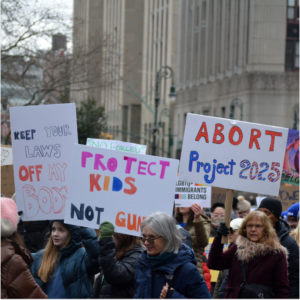17-year-old Olivia Campbell looks at reproductive rights in the US, with a focus on Project 2025

The People’s March in New York against the incoming Trump administration, 18 January 2025.
Picture by: Christopher Penler | Alamy
Article link copied.
January 31, 2025
Trump 2.0: What is the future for reproductive rights in the US?
Donald Trump’s election as the 47th president of the United States has significant implications for the state of reproductive rights in the US and around the world.
Given Trump’s notoriously inconsistent statements over the years on abortion and broader reproductive rights, it is difficult to create a full and accurate analysis of what might happen once he is in office.
In 1999, on NBC, he declared himself to be “very pro-choice”. In 2011, in a speech at the Conservative Political Action Conference, he stated simply: “I am pro-life.”
Harbingers’ Weekly Brief
During his first term, he appointed three conservative justices to the Supreme Court, who were crucial to the overturning in 2022 of the landmark ruling in Roe vs Wade, thereby ending the federal right to abortion in the US. “I did it. And I’m proud to have done it,” said Trump on Fox News.
In March last year, he suggested in a radio interview that he would support a national ban on abortion after 15 weeks of pregnancy. But seven months later, in October, he took to social media to say that he would veto a national ban if it was to land on his desk.
Currently, as a result of the repeal of Roe vs Wade, there is no federal legislation to protect (or deny) abortion, meaning that is up to the individual states. This has led to a patchwork of laws across the country.
Twelve states hold near-total bans on abortion at all periods of gestation, with no exceptions for rape or incest. A further 29 states have restrictions based on foetal development, with cut-offs ranging from six to 24 weeks. Nine states plus the District of Columbia have no gestational bans. A national ban would overrule states’ rights, restricting or further restricting the right to abortion in many states.
One possible indicator of what might happen comes in Project 2025, a 900-page policy document detailing a vision of a new, radically conservative America. It was launched in April 2023 by a longstanding right-wing think tank, the Heritage Foundation, with input from more than 100 conservative organisations, with the aim of guiding a future Republican presidency.
This “mandate for leadership” mentions the word ‘abortion’ 199 times. The foreword professes the necessity of “deleting the terms… abortion, reproductive health, [and] reproductive rights… out of every federal rule, agency regulation, contract, grant, regulation, and piece of legislation that exists.”
The document goes on to detail plans to severely restrict or eliminate abortion – both surgical and medical (via pills) – in American life. While some sections are left vague and provide little more than an ideological goal, others clearly imply or make direct reference to specific legislative changes.
The first phase of the plan is to dismantle existing protections for abortion. The goal is to remove abortion from the umbrella of healthcare, and consequently the associated protections and public funding for abortion and abortion providers.
Medical abortions also emerge as a target of highly restrictive legislation. Project 2025 proposes that the FDA (Food and Drug Administration) withdraw approval for abortion pills and prevent such pills being sent through the post. It also proposes undoing privacy regulations for people who are seeking or have sought abortions.
It is also necessary to consider the impact of Trump’s presidency on a global scale, not just inside the US. President Biden revoked Trump’s previous ‘global gag rule’, which required all foreign NGOS receiving federal money to agree that they would not perform or promote abortion services – which severely limited sexual reproductive health services in many parts of the world.
The rule was first introduced by Ronald Reagan in the 1980s and has changed along party lines ever since, rescinded by Democrats and then reinstated by Republicans.
So far, it’s hard to know to what extent Trump’s actions will follow the ideas presented in Project 2025 – or comply with them, if the document truly is a “mandate”.
The relationship between Trump and Project 2025 has been fraught. Key authors of the plan, such as Russell Vought and Tom Homan, served as his top advisers during his first term in office, and will continue to hold some positions of influence in his second. But he also attempted to distance himself from Project 25 as controversy around it grew in the lead-up to the 2024 election.
However, the ideas professed in the document appear deeply intertwined with the Republican Party, and many of its key players (including the Heritage Foundation and the Leadership Institute) have been important donors to his campaign.
It is highly likely that we will see increased restrictions on abortion services, including medical abortions. There will also be increased levels of misinformation and fearmongering around reproductive health. However, we can equally expect opposition and action from pro-abortion legal and community groups.
Written by:

Writer
Melbourne, Australia
Olivia was born in 2007 in Melbourne, where she is currently a Year 11 student. She hopes to pursue philosophy, microbiology, and language at university.
She joined Harbingers’ Magazine in October 2024 as a Contributor, writing about philosophy and ethics, as well as science and the environment. After successfully completing the Essential Journalism course, Olivia became a Writer for Harbingers’ in March 2025.
In her free time, she enjoys cooking, movies, archery, and karate. Reading and writing are central to her life.
English is the only language Olivia currently speaks fluently. She is studying Latin at school and teaching herself the basics of Yiddish, Turkish, German, and Esperanto.
Edited by:

🌍 Join the World's Youngest Newsroom—Create a Free Account
Sign up to save your favourite articles, get personalised recommendations, and stay informed about stories that Gen Z worldwide actually care about. Plus, subscribe to our newsletter for the latest stories delivered straight to your inbox. 📲
© 2025 The Oxford School for the Future of Journalism


